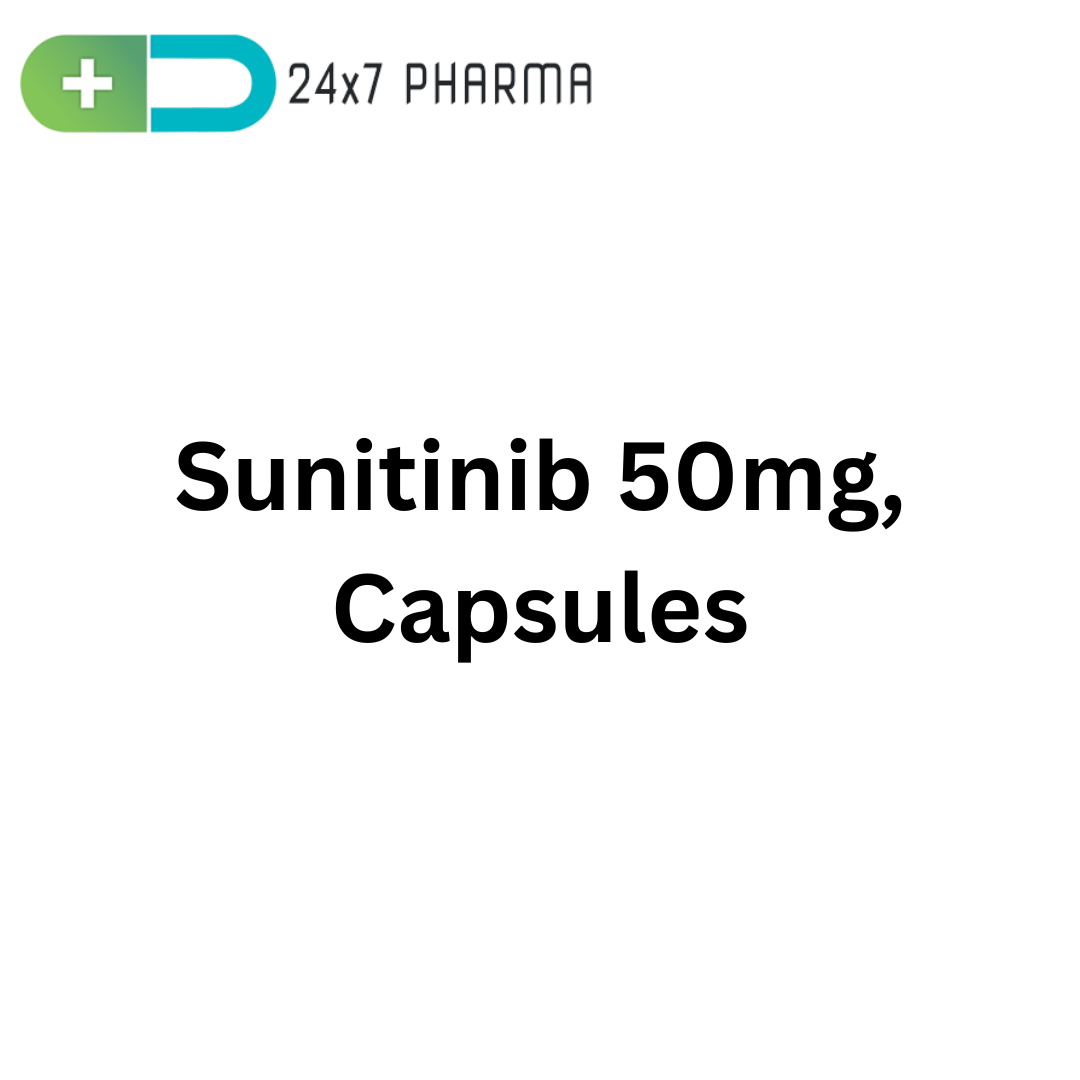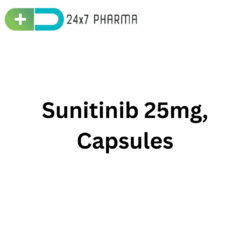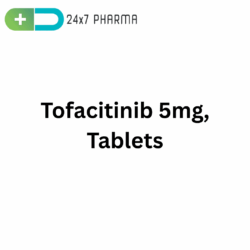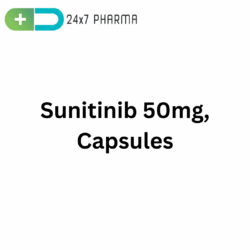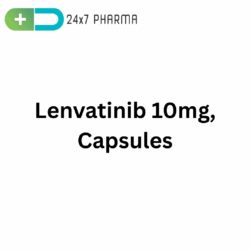LuciSuni 50mg, Sunitinib Capsules
LuciSuni 50mg is a prescription anticancer medication that contains Sunitinib malate as its active ingredient. Sunitinib is a multi-targeted receptor tyrosine kinase inhibitor (RTKI) that interferes with the growth of cancer cells by blocking specific enzymes that promote tumor angiogenesis and cell proliferation. Manufactured under strict pharmaceutical guidelines, LuciSuni 50mg is commonly used in the treatment of various cancers including renal cell carcinoma (kidney cancer), gastrointestinal stromal tumors (GIST), and pancreatic neuroendocrine tumors (pNETs). Its oral administration and broad therapeutic application make it a critical drug in oncology.
What is LuciSuni 50mg (Sunitinib)?
LuciSuni 50mg is a targeted chemotherapy agent designed to treat certain types of cancers by specifically inhibiting multiple cellular receptors involved in tumor growth and spread. It is a member of the tyrosine kinase inhibitor (TKI) medication class. These receptors are typically overactive in cancer cells, which leads to rapid tumor growth and blood vessel formation.
Sunitinib was initially approved by the U.S. FDA in 2006 and is now widely used globally under various brand names. LuciSuni is a generic formulation manufactured in India and offers an affordable alternative with equivalent therapeutic efficacy.
How it Works / Mechanism of Action
Sunitinib targets and inhibits multiple receptor tyrosine kinases (RTKs) that are involved in both tumor growth and angiogenesis (formation of new blood vessels that feed tumors). Specifically, it inhibits:
- Vascular Endothelial Growth Factor Receptors (VEGFRs)
- Platelet-Derived Growth Factor Receptors (PDGFRs)
- c-KIT
- FLT3
- RET
- CSF-1R
By blocking these kinases, Sunitinib reduces tumor blood supply, limits cancer cell proliferation, and induces cancer cell death (apoptosis). This multitargeted mechanism helps in treating tumors that rely on various signaling pathways to grow and metastasize.
How to Use / Indications
LuciSuni 50mg is primarily used to treat the following conditions:
- The most prevalent kind of kidney cancer in adults is called renal cell carcinoma (RCC).
- Gastrointestinal Stromal Tumors (GIST): Particularly in patients who are resistant to or intolerant of imatinib.
- Pancreatic Neuroendocrine Tumors (pNETs): Locally advanced or metastatic tumors that cannot be surgically removed.
- Other Off-label Uses: Occasionally used in other rare cancers as decided by the oncologist.
- Always use LuciSuni 50mg under the supervision of an oncologist or a specialist experienced in cancer therapy.
How to Take / Dosage
The dosage and duration of treatment depend on the type and stage of cancer, patient tolerance, and overall health status. The typical dosing schedule is:
Renal Cell Carcinoma and GIST:
- 50 mg per day for four weeks of treatment, with a two-week break (6-week cycle).
- LuciSuni 50mg may be taken as two tablets daily or as part of a combination with other strengths.
Pancreatic Neuroendocrine Tumors (pNETs):
- 37.5 mg daily continuously, without the 2-week break.
Administration Instructions:
- Take with or without food.
- Swallow the tablet whole with water.
- Take it at the same time each day.
Other Dosage Forms
Sunitinib is available in various strengths to accommodate individual patient needs, such as:
- 12.5 mg
- 25 mg
- 37.5 mg
- 50 mg
Dose adjustments may be required for patients experiencing side effects or those with liver/kidney issues.
Side Effects
Common Side Effects:
- Fatigue
- Diarrhea
- Nausea or vomiting
- Mouth sores
- High blood pressure (hypertension)
- Skin discoloration
- Hand-foot syndrome (palmar-plantar erythrodysesthesia)
- Loss of appetite
- Hair color changes
Serious Side Effects:
- Heart problems (heart failure or irregular heartbeat)
- Liver damage
- Bleeding or clotting disorders
- Severe hypertension
- Tumor lysis syndrome
- Gastrointestinal perforation
- If any severe symptoms appear (e.g., chest pain, fainting, sudden bleeding), seek immediate medical attention.
Storage
- Store LuciSuni 50mg at room temperature (15°C to 30°C).
- Keep away from direct light, moisture, and heat.
- Store in a tightly sealed container.
- Keep out of reach of children and pets.
- Do not use expired medication.
Benefits
- Effective Tumor Control: Sunitinib has shown strong tumor response and disease stabilization in multiple cancer types.
- Oral Administration: No need for injections or infusions.
- Multi-Targeted Action: Simultaneously inhibits multiple pathways critical to cancer growth and angiogenesis.
- Improved Survival Rates: Extends progression-free survival in patients with RCC, GIST, and pNETs.
- Adaptable Dosage: Available in various strengths for easy dose titration.
Prescription
LuciSuni 50mg is a prescription-only medication and must be taken under the guidance of a qualified healthcare provider. A full clinical assessment, including liver and kidney function tests, ECGs, and blood pressure monitoring, is necessary before and during treatment.
Drug Interactions
Sunitinib can interact with several other medications, affecting its efficacy or increasing side effect risks.
Major Interactions:
- CYP3A4 inhibitors (e.g., ketoconazole, clarithromycin): Increase Sunitinib levels.
- CYP3A4 inducers (e.g., rifampin, carbamazepine): Reduce Sunitinib effectiveness.
- Antihypertensive agents: Risk of blood pressure fluctuation.
- Anticoagulants (e.g., warfarin): May increase bleeding risk.
Always inform your doctor of all medications, supplements, and herbal products you are using.
FAQs
How long will I need to take Sunitinib?
It depends on your cancer type and response to treatment. Some patients take it for several cycles or months.
Can LuciSuni be take with alcohol?
It’s best to avoid alcohol, as it may increase the risk of liver toxicity.
Will my hair change color?
Yes, hair depigmentation (lightening or graying) is a known side effect.
Conclusion
LuciSuni 50mg (Sunitinib) is a powerful oral anti-cancer medication that targets various receptor tyrosine kinases essential for tumor growth and survival. Its role in managing complex cancers like RCC, GIST, and pNETs makes it a cornerstone in oncology therapy. Regular monitoring and personalized dosing ensure its effectiveness and patient safety. Always consult your healthcare provider for tailored guidance during Sunitinib therapy.

